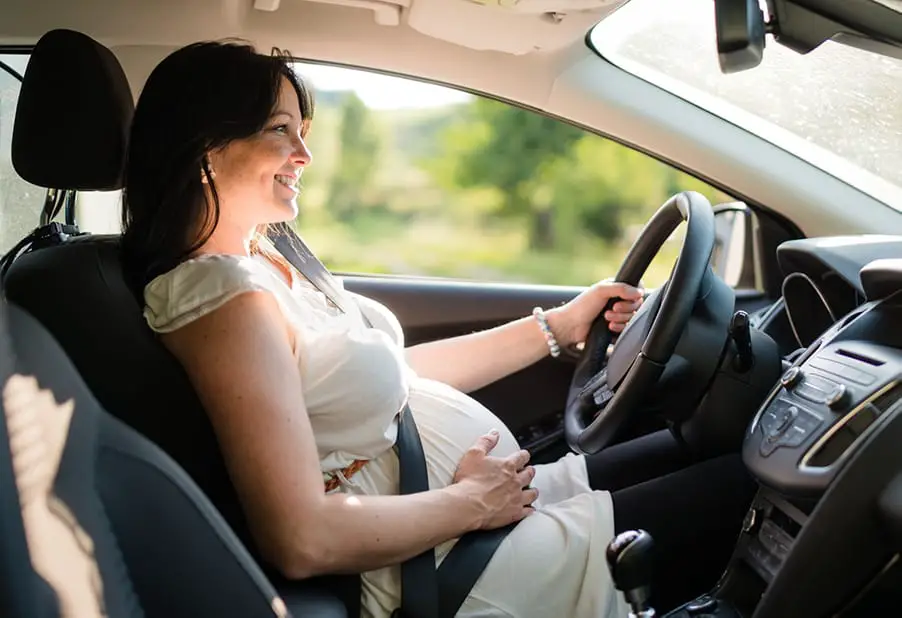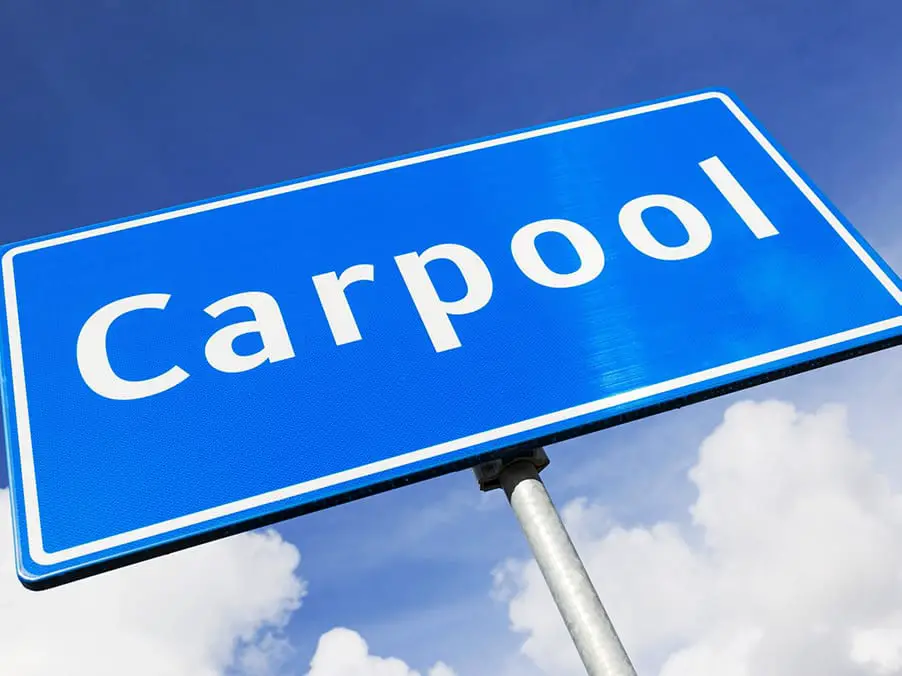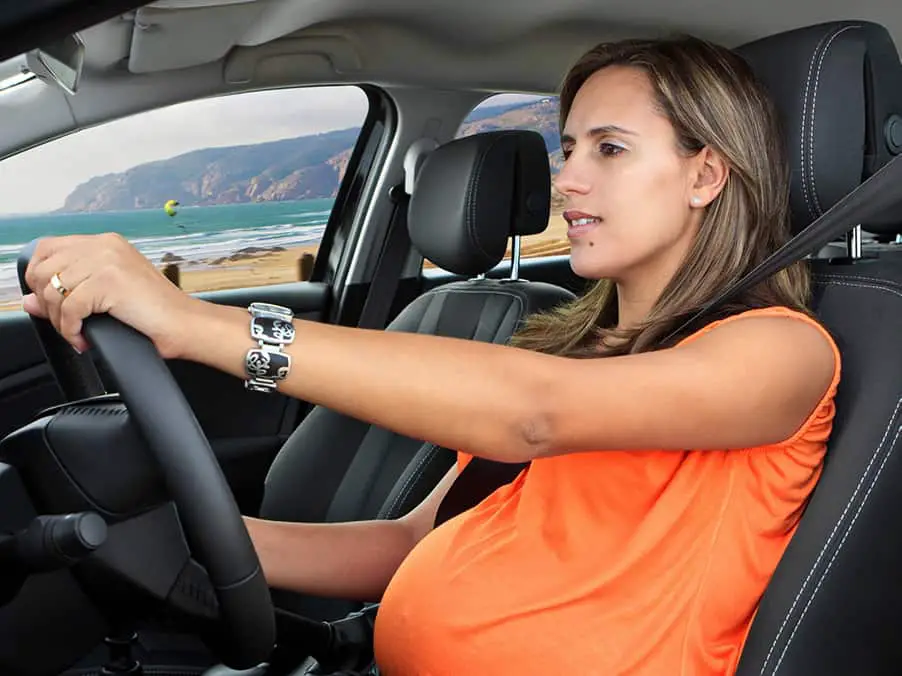
In the US, multiple court cases have been heard in which a pregnant woman has argued that their pregnancy is an acceptable reason to drive in the carpool lane. While this may appear to be a silly question at first, it is actually very interesting from both a legal and philosophical perspective.
Pregnancy is not a valid reason to drive in the carpool lane since, in this context, a person is legally defined as an individual who occupies a separate seat to the driver. While laws vary from state to state, foetuses are generally not considered passengers until they are born.
Although there seems to be a pretty clear answer to this question, there is a lot to talk about still! In this article, we will be looking at the legal and philosophical considerations surrounding pregnancy and carpooling. Let us get stuck in!
A Brief History of Carpooling
Carpooling (or ridesharing) has a long and colourful history, going back over a hundred years. In the early 1900s, the government tried to crack down on carpooling, since it interfered with the profits of streetcar operators. These government interventions resulted in a 90% drop in carpooling.
During the second world war, however, the government did a U-turn and spent $100 million (in today’s money) promoting carpooling in order to save resources. This gave rise to the famous poster which read, “when you ride alone, you ride with Hitler.” These days, the practice is surging once more, spurred on by smartphone apps that connect drivers to passengers.
What Is the Point of Carpool Lanes?

The idea of carpool lanes, also known as high-occupancy vehicle (HOV) lanes, is that it provides an incentive for people to drive with a passenger by giving such people a quicker commute. This is desirable because more people per car means less traffic congestion, which results in lower emissions of greenhouse gases (GHGs) and other air pollutants, which have a negative effect on health.
HOV lanes improve commute times on public transport, and this also serves to reduce emissions of various pollutants, since taking the bus is better for the environment than driving. They also help busy parents to get their kids to school since children qualify as passengers. This can be very valuable if the parent has to go to work after dropping off the kids!
We have a full article on the purpose of the carpool lane so check it out!
Who Qualifies for the Carpool Lane?
Unfortunately, this varies from state to state, making it a difficult question to answer. As a general rule, you are eligible if you have two or more people in the car. Often, carpool lanes will be separated into ‘2+’ or ‘3+’ lanes, which tells you how many people need to be in the car for you to use the lane. Depending on the state, you may also be eligible to drive solo in the lane if you drive a low-emissions vehicle like an electric or hybrid car.
Motorbikes and bicycles are also eligible in most states, although, in Ontario, a motorbike must have two passengers to qualify. Other exemptions include buses, police vehicles, ambulances, and other public service vehicles.
Pregnancy and Carpooling – The Court Cases
Believe it or not, there have been a few different court cases surrounding this issue! Let us take a look at a couple to see what the arguments were, and what the judge decided in each case:
Candace Dickinson
This is perhaps the most famous case. In November of 2005, 23-year-old Candace Dickinson was fined $367 for driving alone in the HOV lane. She fought the fine in court on the basis that her unborn child, who was just weeks away from the due date, counted as a passenger. Indeed, the baby was born just 13 days later. You can see where she was coming from; just two weeks later, the same child would suddenly be counted as a separate passenger.
This, however, is not unique to the case of carpooling. An unborn child also does not, for example, need a ticket to see a movie or travel by plane, whereas a baby does. Foetuses simply have different legal properties to babies. At the time, CBC quoted Sgt Dave Norton, who issued the ticket, as saying of Dickinson’s argument that it “would require officers to carry guns, radios and pregnancy testers, and I don’t think we want to go there.”
In this case, the judge ruled that an unborn foetus did not count as a passenger, since the legal definition of a passenger in this context is an individual who occupies a separate seat in the vehicle.
Sue Ann Yasger
This case, which happened in California way back in 1987, involved a woman who was five months pregnant. The main difference between this case and the case of Candace Dickinson was that the judge dismissed Yasger’s $52 fine “in the interest of justice.” The California Highway Patrol, however, did not accept the judgment, saying that they would continue to issue tickets for pregnant women driving in the carpool lane.
Yasger’s case was largely one of principle. According to the LA Times, she queued for 4 hours at the municipal court to post a bond with the same price as the fine itself. Yasger’s efforts were not in vain. Just a few months later, a woman named Diane Correl, who was given a ticket for the same reason, showed the judge a newspaper clipping about Yasger’s case, prompting the judge to drop that ticket as well!
Pregnancy and Carpooling – The Philosophy

Philosophers have long been preoccupied with the question of what makes a person a person. Modern issues continually bring this question back to the forefront of thinking, for example, when we are forced to consider whether an artificial intelligence is a person. If we think that AIs can be persons, then we have to accept that they have legal rights. That means we might have to accept that the AI of a self-driving car counts as a passenger!
The primary area in which this is discussed, however, is the controversial case of abortion. This deals with the question of when a person becomes a person, making it more relevant to this topic than the case of an AI. There has been much debate surrounding the period in which it is morally acceptable to abort a foetus, and this revolves around when the foetus is considered to gain personhood.
This question is not simply a lofty debate for philosophers with too much time on their hands. When a person is considered a person has important ramifications for the law. For example, even though a foetus is not considered a person in the case of HOV lanes, killing a pregnant woman in a car crash is considered a double homicide.
Summary
In general, pregnancy is not a valid reason to drive in the carpool lane from a legal perspective. That is because a passenger is generally defined as an individual who occupies a separate seat to the driver. Another problem is that if a foetus is defined as a person, then you could actually be violating another law, which is the law that two people cannot sit behind the driver seat at the same time!
What appears at first to be a silly question actually turns out to be a very interesting legal and philosophical problem. On the practical side, make sure to check the specific laws used by your local or state government to find out if you can carpool with your foetus.

